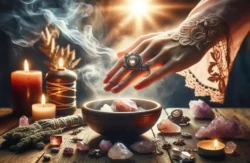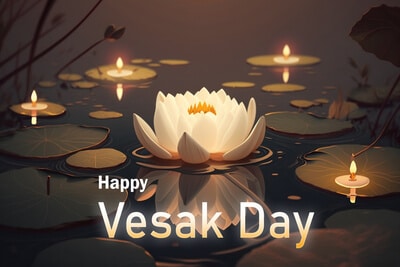Buddha’s birthday is a Buddhist festival celebrating the birth of Siddhartha Gautama, who later became known as the Buddha or the “Enlightened One.”
Known as the Gautama Buddha, he founded Buddhism.
The exact date of Buddha’s birth is uncertain, but it is believed to have occurred between 563 to 483 BCE in Lumbini, Nepal.
Next after this publicity
History of Gautama Buddha and Buddhism
Buddhism was founded in the 5th and 6th centuries B.C. Siddhartha Gautama founded Buddhism in India. Siddhartha Gautama was born to an elite family in the small Shakya Republic, now part of Nepal. He became a sramana ascetic after reaching adulthood, studying under various teachers. Finally, under a Bodhi tree, Gautama found enlightenment after six years of searching for a solution to human suffering.
It took Buddha 45 years to spread his doctrine and establish his religion on the Gangetic Plains of north-central India. Buddhism evolved from Buddha’s teachings after he died in 483 B.C. In the Mauryan Empire (322 B.C. to 185 B.C. Buddhism became the state religion of India, spreading to China and Greece as well.
Archaeologists discovered evidence that Buddha’s birthplace was in the sixth century BCE, and the Asian lunisolar calendars determine the celebration of Buddha’s birthday.
When Is Buddha’s Birthday Celebrated?
In most Buddhist traditions, it is celebrated on the full moon day of the lunar month of Vesakha, which usually falls in April or May. It may be observed in June during leap years. However, in some countries, such as Japan and Taiwan, it is celebrated on a different day based on the Gregorian calendar. This year, it is celebrated on May 26th.
The celebration of Buddha’s birthday varies from country to country and even within different Buddhist communities. It is a public holiday in some places, and people gather at temples and monasteries to participate in special rituals and offerings. In other areas, it may be a more low-key event, with families gathering to light candles, recite prayers, and offer food and gifts to monks. Now let’s talk about the celebration in various countries.
Next after this publicity
Buddha’s Birthday Festivals in Japan
Buddha’s birthday is known in Japanese as the “flower festival” or Hana-matsuri. This is because when the cherry blossoms begin to bloom, that is the time that the Buddha’s birthday festivals are held in Japan. After all, flowers play a crucial role in this celebration. Celebrations occur in Buddhist temples, as those celebrating drink sweet tea made with flowers and place lotuses around the neck of the Buddha statues. The purpose of that is it symbolizes the way water and flowers dropped from the heavens at the time of Buddha’s birth. Let’s talk about how South Korea celebrates Buddha’s birthday.
Buddha’s Birthday Festivals in South Korea
South Korea does not utilize flowers like Japan; it uses lotus-shaped lanterns instead. Those celebrating Buddha’s birthday will begin to hang those lanterns on the streets, in temples, and their homes. The celebration in South Korea is known as Seokga Tansinil. They will get to it a month before the celebrations. The lanterns have not only the shape of a lotus but also bright and vibrant colors. People can donate to the temple to hang the lanterns with their names and the wish they want to grant. So if you go to South Korea during the time leading up to Buddha’s birthday, you will see brightly-colored and lotus-shaped lanterns everywhere.
There is also a parade that takes place each year that shows off the lanterns that are shaped like dragons and Buddha. During the celebrations, temples provide various vegetable and rice dishes. In addition, plenty of acrobatic shows and mask dances take place. So let’s talk about how Thailand celebrates Buddha’s birthday.
Buddha’s Birthday Festivals in Thailand
In Thailand, the celebration of Buddha’s birthday happens around temples as Buddhists attend there so they can listen to prayers and can chant. The celebration is known as Visakha Puja. In addition, they will donate candles, food, and flowers. The purpose of that is that it symbolizes removing anything material that is from your life that you do not need. It is all about letting go.
Worshipers will walk around the temples at night, holding incense, candles, and flowers. Others will also let their fish into the rivers or lakes and release their birds into the air to cleanse their souls. Now, let’s talk about how Indonesia observes Buddha’s birthday.
Buddha’s Birthday Festivals in Indonesia
The world’s largest and oldest Buddhist temple, the Mendut, is in Borobudur, Indonesia. The celebration of Buddha’s birthday is known as Waisak, a massive event in the country. A large procession begins at the temple, where people take part to celebrate.
Next after this publicity
But, before they head there, they will clean their Buddha statues, donate to needy people, and visit older people to keep them company. They will do all the good deeds imaginable before participating in the procession. And in the late evening, they will light candles as they toss and release their lanterns in the air. Now, let’s take a look and see how Sri Lanka celebrates Buddha’s birthday.
Buddha’s Birthday Festivals in Sri Lanka
The Buddha’s birthday celebration in Sri Lanka is known as Vesak, lasting for about a week. Those who celebrate will create large illuminated pictures of how Buddha lived, known as pandols. In addition, people decorate streets and houses with lanterns, candles, and many colors. Another thing that families and restaurants do, as long as they have the budget for it, is to set up stands to offer civilians free food and drinks, and that is known as dansalas. Butcher shops are closed as there is no meat available during Vesak. Let’s talk about how Buddha’s birthday is celebrated in Nepal.
Buddha’s Birthday Festivals in Nepal
The belief is that Buddha’s birth occurred in Lumbini, Nepal, and people will pray and light candles at temples. In addition, it is a time to express kindness so no one will eat meat, and they will donate to those in need. Those active in the celebrations will pass around a sweet rice pudding to others, symbolizing what Buddha had taken to break the fast. Finally, let’s review how Buddha’s birthday is celebrated in China.
Buddha’s Birthday Festivals in China
Buddha’s birthday is a significant observance in China. The Chinese will celebrate the day by attending the temple to bathe in the Buddha and do plenty of chanting and lighting incense. They believe that during Buddha’s birth, dragons were spitting out water for the purpose of bathing him, which is why civilians who celebrate clean themselves. It symbolizes cleansing their mind and soul as they show Buddha respect, gratitude, and devotion. Now, let’s review the typical cuisines eaten during Buddha’s birthday.
Cuisines Used To Celebrate Buddha’s Birthday
The types of cuisines used to celebrate Buddha’s birthday depend on the country. Still, vegetarian foods are generally preferred to show respect for Buddhist beliefs in nonviolence and compassion for all living beings.
In some countries, such as Korea and Japan, a popular food for Buddha’s birthday is a sweet rice cake called “songpyeon” or “mochi” respectively. These cakes are typically made from glutinous rice flour and filled with sweet fillings such as sesame, red bean, or chestnut paste.
In China, a dish called “Labazhou” is often eaten on Buddha’s birthday. It is a sweet porridge made from glutinous rice, lotus seeds, and other ingredients.
In some Buddhist communities, a practice known as “Dana” is observed on Buddha’s birthday, which involves giving food to those in need to practice generosity and kindness. The foods used to celebrate Buddha’s birthday are vegetarian, sweet, and symbolic of the holiday’s themes of peace, compassion, and generosity.
Regardless of the specific traditions and practices, the celebration of Buddha’s birthday is an opportunity for Buddhists to reflect on the teachings of the Buddha and the importance of compassion, wisdom, and kindness in their lives.












































